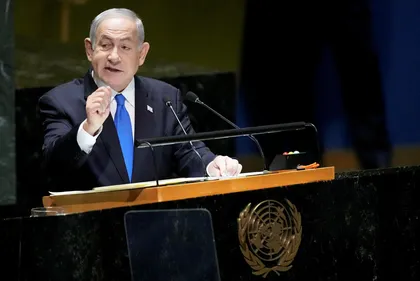Netanyahu found himself delivering a speech to a visibly empty hall at the United Nations headquarters in New York, a moment widely interpreted as a symbolic reflection of Israel’s deepening diplomatic isolation on the global stage. The striking image, which has since circulated widely on international media platforms, underscores the mounting backlash Israel is facing over its continued military actions in Gaza and its broader handling of the Palestinian question.
The unusually sparse attendance during Netanyahu’s address comes amid a wave of boycotts, walkouts, and growing criticism from member states within the UN system — a rare but telling signal of international discontent. While it is not unprecedented for world leaders to speak to thin audiences during UN General Assembly meetings, the deliberate absence of many delegates during the Israeli leader’s speech has been interpreted as a silent protest against Tel Aviv’s policies.
Multiple diplomatic sources have confirmed that a number of countries, including some from Africa, Latin America, and the Middle East, intentionally stayed away from the hall as a form of passive resistance. The move aligns with a growing trend among nations calling for a ceasefire in Gaza and the need for an immediate humanitarian response to the worsening crisis in the besieged territory. The United Nations and several humanitarian organisations have repeatedly raised alarms about civilian casualties, food shortages, and the destruction of critical infrastructure in Gaza, all of which have added pressure on Israel to exercise restraint.
During his speech, Prime Minister Netanyahu defended Israel’s actions as a matter of national security and accused what he described as “double standards” in international responses to the conflict. He maintained that Israel is acting in self-defence and reaffirmed the state’s right to protect its citizens from terrorism. However, the empty seats in the General Assembly hall may have spoken louder than words, casting a shadow over his message and highlighting the growing diplomatic rift between Israel and many UN member states.
Back home, the Netanyahu government continues to face internal and external pressures, with protests, legal battles, and international calls for accountability further complicating his leadership. Human rights bodies have called for independent investigations into alleged war crimes, and some nations are reportedly considering diplomatic sanctions if the situation in Gaza does not de-escalate.
This latest episode at the United Nations marks a significant moment in Israel’s foreign relations. Once considered a key ally of several Western powers, Israel is now navigating an increasingly fractured international landscape, with its long-standing diplomatic capital being tested like never before.
For African observers, including Nigeria and other members of the Non-Aligned Movement, the incident raises questions about the future of multilateral diplomacy and the role of moral leadership in global governance. As the conflict rages on, the optics of an empty UN hall during a major speech by the Israeli prime minister may go down in history as a defining symbol of a world growing weary of war without end.
